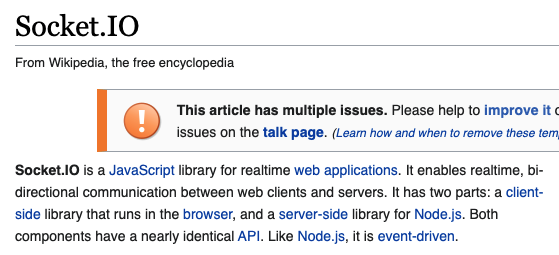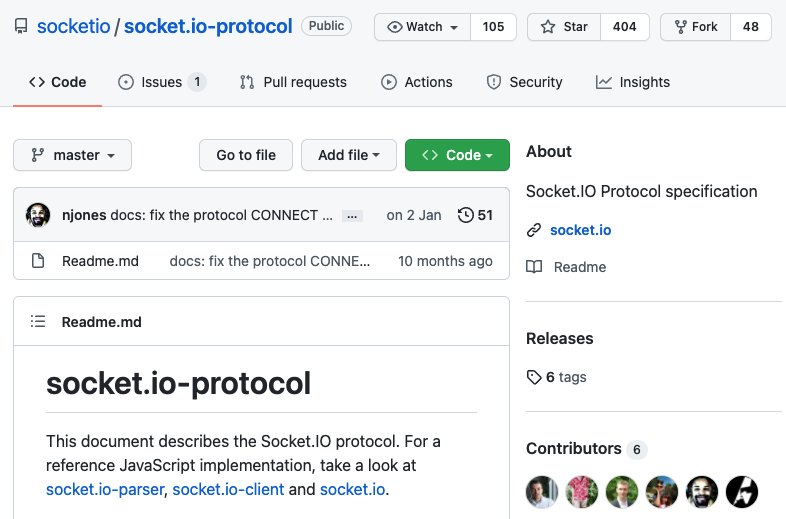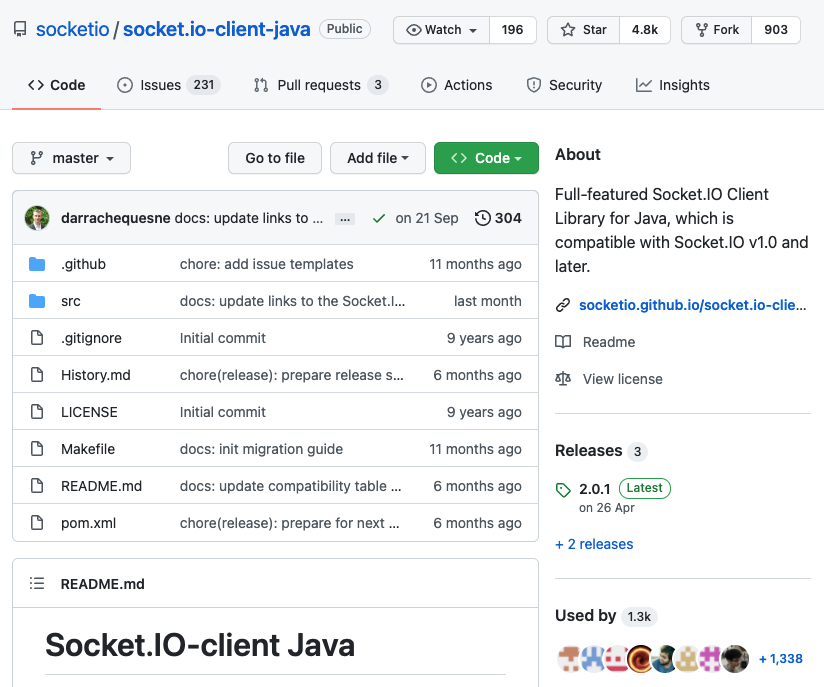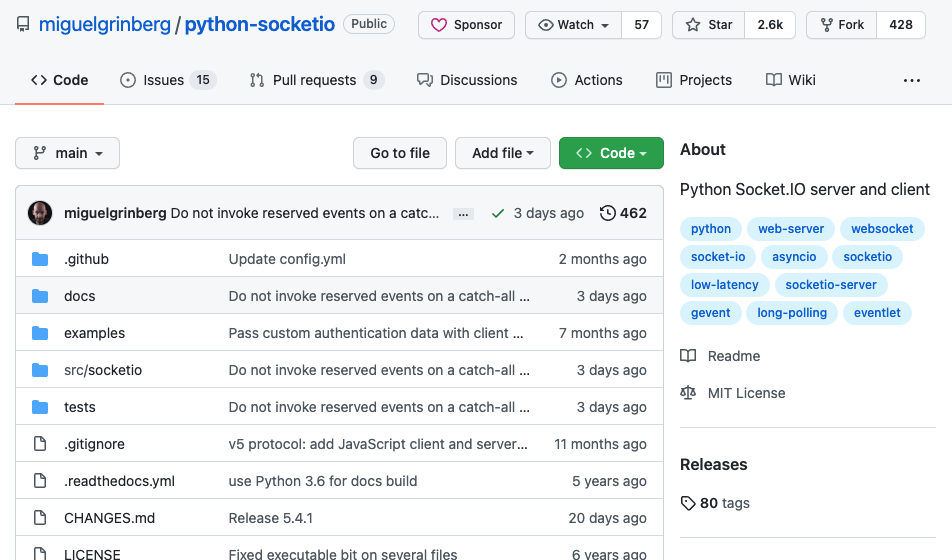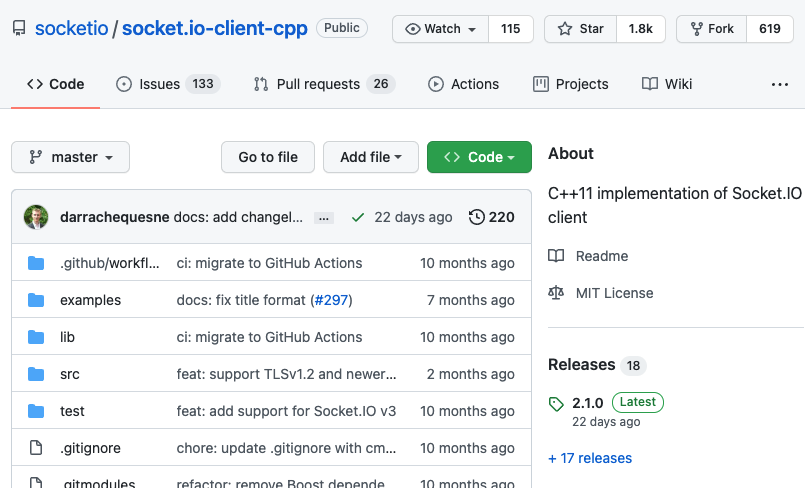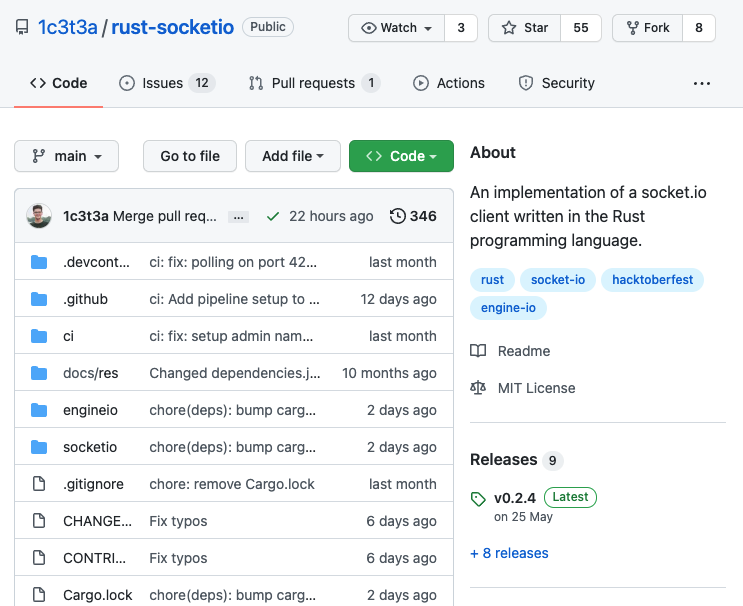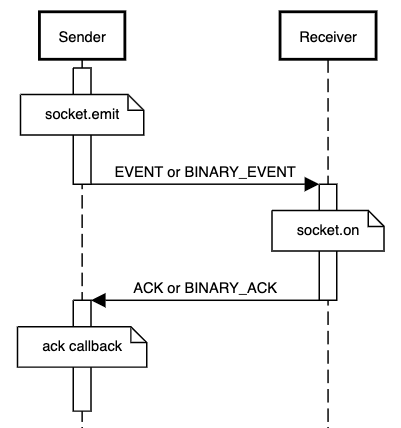How to document a Socket.IO API?
Dimitrios Dedoussis
AsyncAPI Conference 2021
Agenda
- Intro
- Story from RL
- What is Socket.IO?
- Modelling the Socket.IO protocol using AsyncAPI
- In practice
- Asynction
- Q&A
About me
Asynction
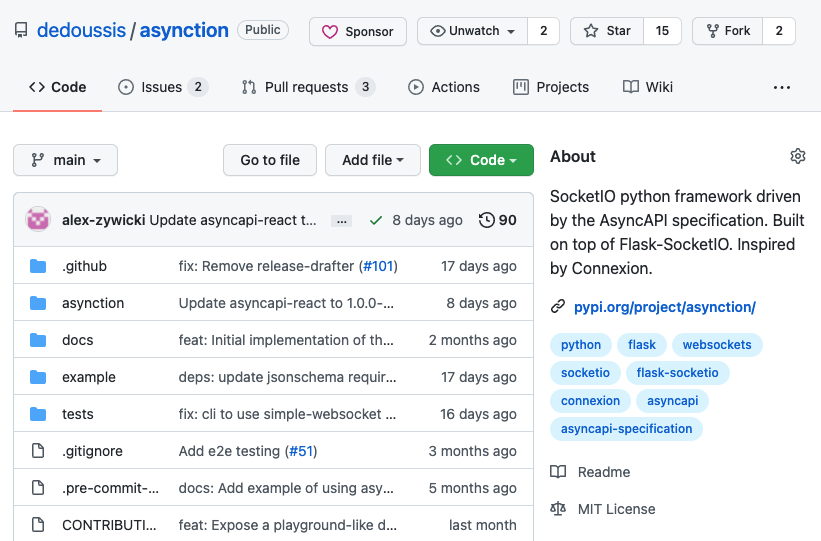
How it all started
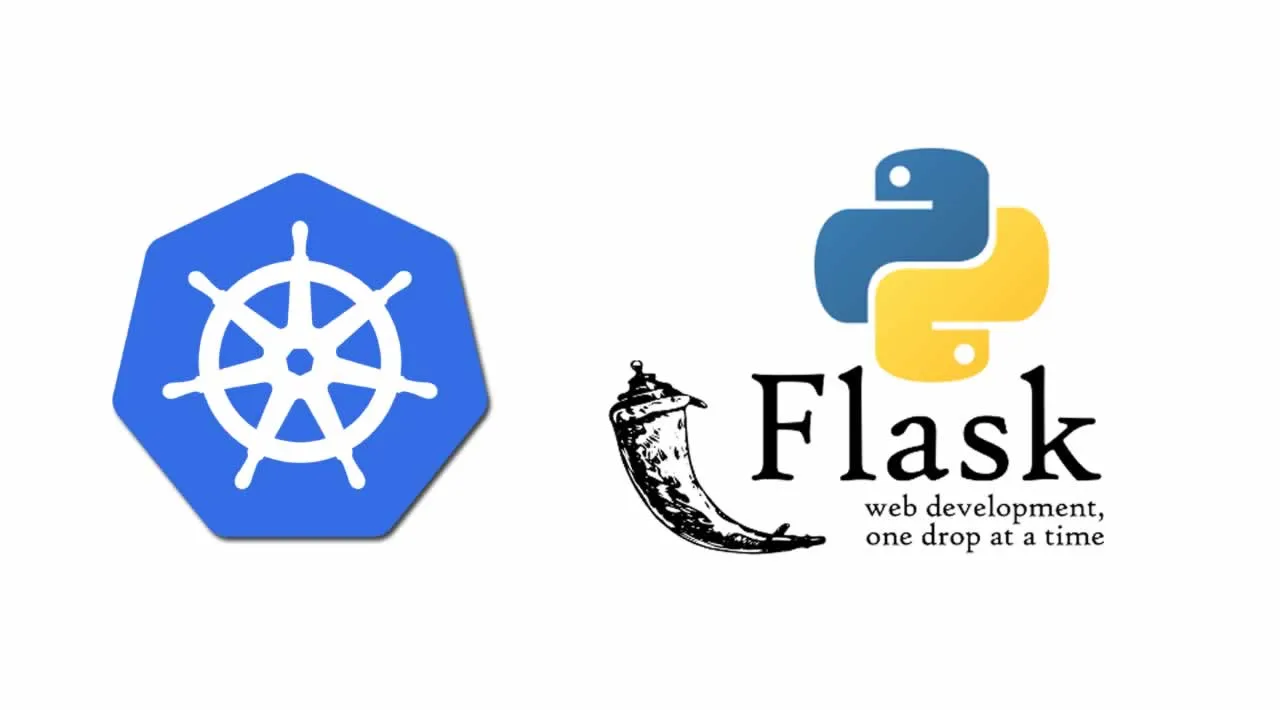
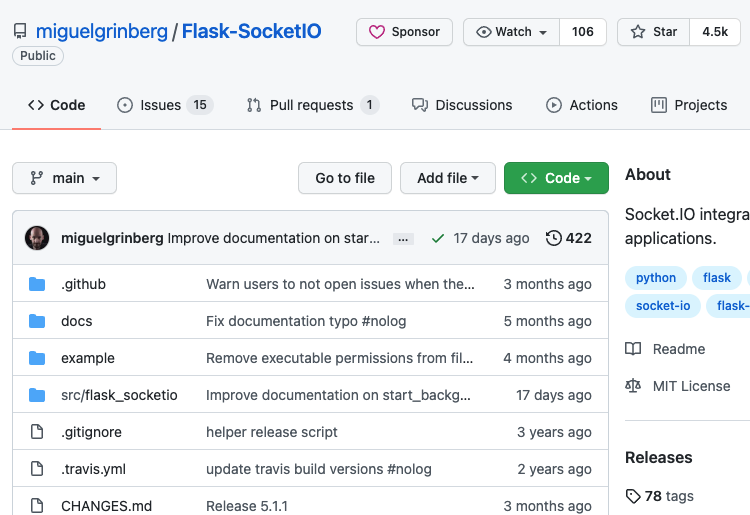




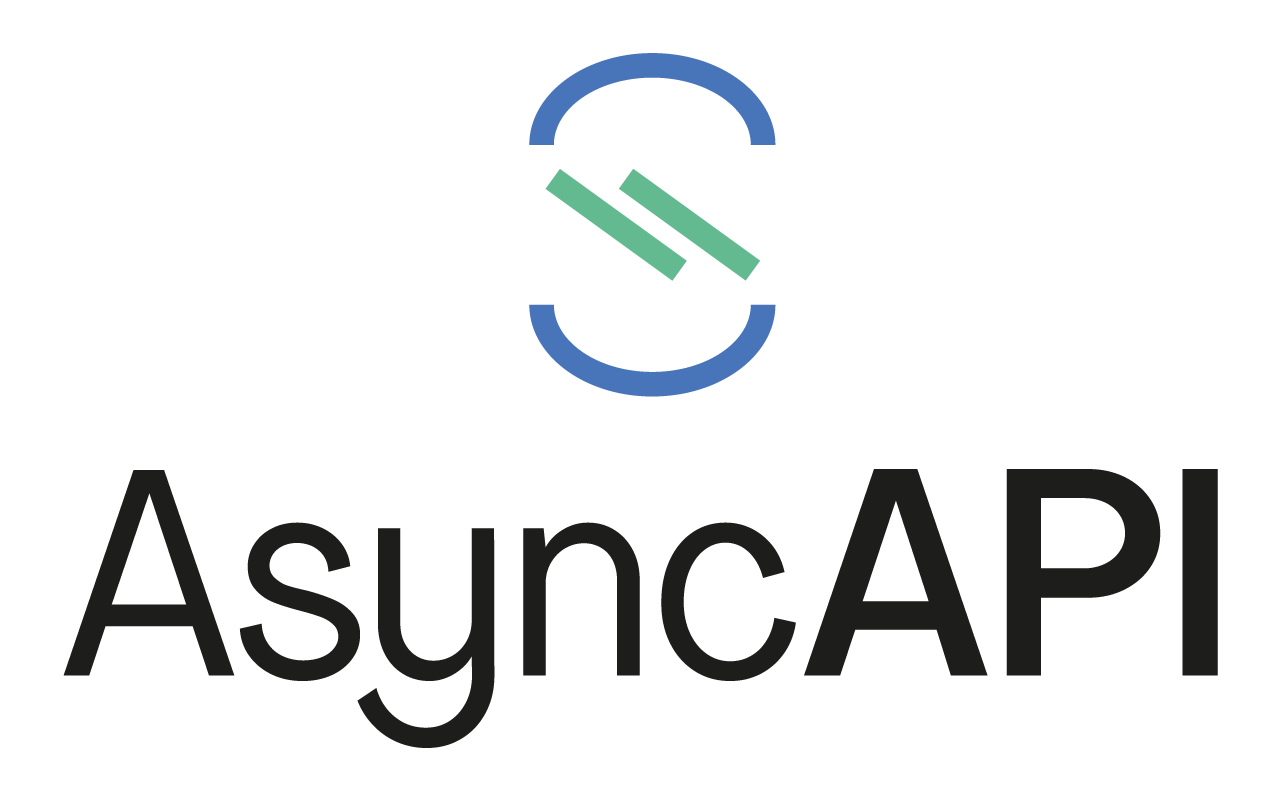
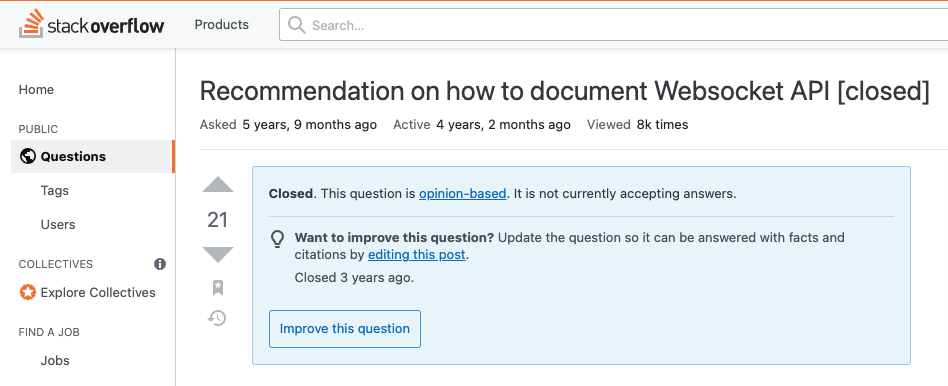
What is Socket.IO? 🤔

Features over plain WebSockets
- reliability
- automatic reconnection
- packet buffering
- acknowledgements
- broadcasting
- multiplexing
The Socket class
interface Socket {
on(eventName: string, callback: Callback): void
emit(eventName: string, ...args: any, ack: Callback): void
}
interface Socket {
on(eventName: string, callback: Callback): void
emit(eventName: string, ...args: any, ack: Callback): void
}- Registers a new handler (callback) for a given event
- Implements a subscribing operation
- The return value of the callback is sent to the sender party as an acknowledgement
interface Socket {
on(eventName: string, callback: Callback): void
emit(eventName: string, ...args: any, ack: Callback): void
}- Emits an event to the receiver party
- Implements a publishing operation
- The ack callback is invoked only if the receiver returns an acknowledgment
Namespace
- Enables multiplexing capabilities
- Has its own handlers (and potentially its own dedicated connection)
- / is the default -- Can set up multiple namespaces
Why document a Socket.IO API?
const io = require("socket.io")(3000);
io.on("connection", socket => {
socket.emit("Hello!");
socket.emit("greetings", "Hey!", { "ms": "jane" }, Buffer.from([4, 3, 3, 1]));
socket.on("message", (data) => {
console.log(data);
});
socket.on("salutations", (elem1, elem2, elem3) => {
console.log(elem1, elem2, elem3);
});
});Not interested in
Modelling the Socket.IO protocol using AsyncAPI
 Mapping AsyncAPI objects to semantics of the Socket.IO client API
Mapping AsyncAPI objects to semantics of the Socket.IO client API
AsyncAPI Object
This is the root document object
-
asyncapi: Spec version being used -
channels: The available channels and messages for the API -
servers: Provides connection details of servers -
components: An element to hold various schemas
Channels
channels:
/: {} # Channel Item Object
/admin: {} # Channel Item Object- Addressable components where messages/events flow through
- Enable the application to separate its concerns
- Sounds very similar to a Socket.IO namespace ✅
Channel Item Object
channels:
/:
publish: {} # Operation object - Ignore this for now
subscribe: {} # Operation object - Ignore this for now
bindings:
ws:
query:
type: object
properties:
token:
type: string
required: [token]Bindings are protocol specific information for the server.
const socket = io("wss://example.com", {
query: {token: "admin"}
});
Conventions for bindings
- Include bindings under the main namespace but omit them under the custom ones
- If a custom namespace includes bindings, then the client should always force a new connection when connecting to it
- WebSockets Channel Binding is the only possible binding for Socket.IO APIs
In an ideal 🌎
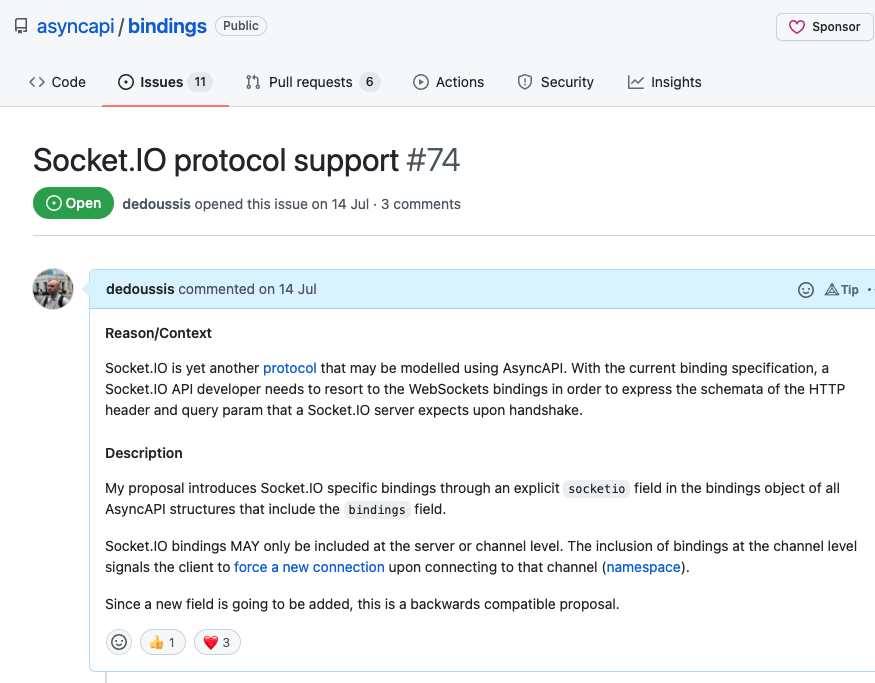
Operations
Document how and why messages are sent/received...
publish ➡️ socket.emit
subscribe ➡️ socket.on
Message
channels:
/:
publish: # socket.emit(eventName[, …args][, ack])
message:
name: hello # eventName
payload: # args
type: object
properties:
foo:
type: string
subscribe: # socket.on(eventName, (...args) => {})
message:
name: hello # eventName
payload: # args
type: object
properties:
foo:
type: string
Multiple messages
channels:
/admin:
publish:
message:
oneOf:
- $ref: "#/components/messages/MessageOne"
- $ref: "#/components/messages/MessageTwo"ACK semantics
Specification Extension ⚠️
-
Message
Objects MAY include the
x-ackfield. The value of this field SHOULD be a Message Ack Object. -
Components
Object MAY include the
x-messageAcksfield.
Message Ack Object
| Field name | Type | Description |
|---|---|---|
| args | Schema Object | Schema of the arguments that are passed as input to the acknowledgement callback function |
channels:
/:
publish: # socket.emit(eventName[, …args][, ack])
message:
name: hello # eventName
payload: # args
type: object
properties:
foo:
type: string
x-ack:
args:
type: integer
subscribe: # socket.on(eventName, (...args) => {})
message:
name: hello # eventName
payload: # args
type: object
properties:
foo:
type: string
x-ack:
args:
type: integer
Servers
servers:
production:
url: example.com/apis/socket.io
protocol: wss
const socket = io("wss://example.com/my-namespace", {
path: "/apis/socket.io" // defaults to "/socket.io"
});
Summary
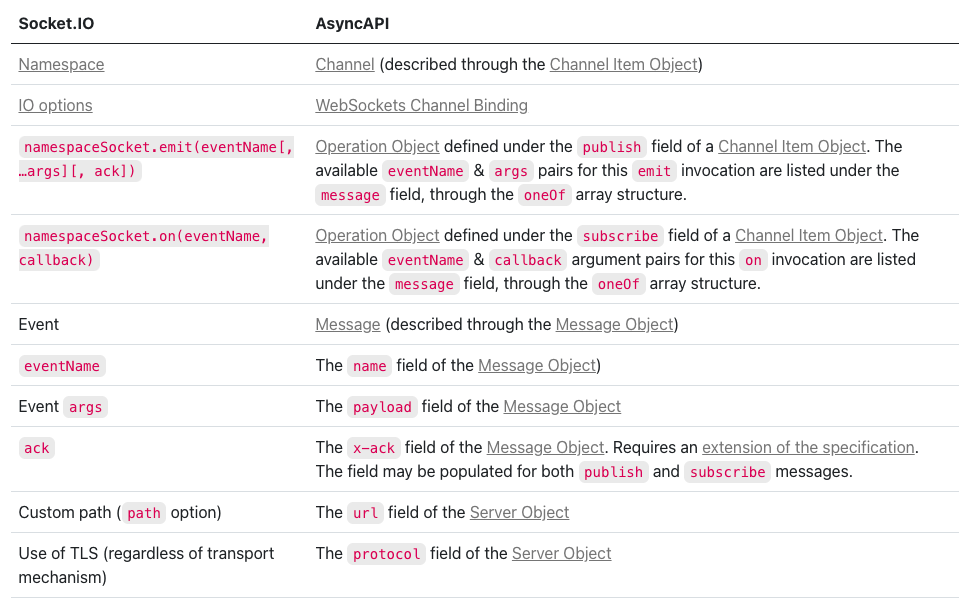
Minimal chat application
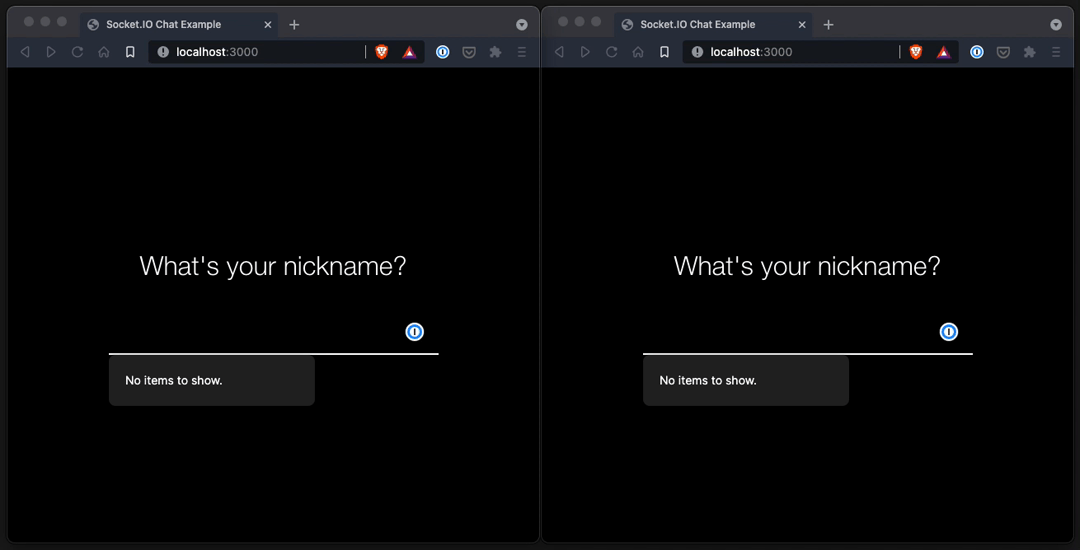 https://socket.io/demos/chat
https://socket.io/demos/chat
// Setup basic express server
const express = require("express");
const app = express();
const path = require("path");
const server = require("http").createServer(app);
const io = require("socket.io")(server);
const port = process.env.PORT || 3000;
server.listen(port, () => {
console.log("Server listening at port %d", port);
});
// Chatroom
let numUsers = 0;
io.on("connection", (socket) => {
let addedUser = false;
// when the client emits 'new message', this listens and executes
socket.on("new message", (data) => {
// we tell the client to execute 'new message'
socket.broadcast.emit("new message", {
username: socket.username,
message: data,
});
});
// when the client emits 'add user', this listens and executes
socket.on("add user", (username, cb) => {
if (addedUser) {
cb({ error: "User is already added" });
return;
}
// we store the username in the socket session for this client
socket.username = username;
++numUsers;
addedUser = true;
socket.emit("login", {
numUsers: numUsers,
});
// echo globally (all clients) that a person has connected
socket.broadcast.emit("user joined", {
username: socket.username,
numUsers: numUsers,
});
cb({ error: null });
});
// when the client emits 'typing', we broadcast it to others
socket.on("typing", () => {
socket.broadcast.emit("typing", {
username: socket.username,
});
});
// when the client emits 'stop typing', we broadcast it to others
socket.on("stop typing", () => {
socket.broadcast.emit("stop typing", {
username: socket.username,
});
});
// when the user disconnects.. perform this
socket.on("disconnect", () => {
if (addedUser) {
--numUsers;
// echo globally that this client has left
socket.broadcast.emit("user left", {
username: socket.username,
numUsers: numUsers,
});
}
});
});
// Admin
io.of("/admin").on("connection", (socket) => {
let token = socket.handshake.query.token;
if (token !== "admin") socket.disconnect();
socket.emit("server metric", {
name: "CPU_COUNT",
value: require("os").cpus().length,
});
});First things first
asyncapi: 2.2.0
info:
title: Socket.IO chat service
version: 1.0.0
description: |
This is one of the get-started demos listed in the SocketIO website: https://socket.io/demos/chat/
servers:
demo:
url: socketio-chat-h9jt.herokuapp.com/socket.io
protocol: wss
Channels
const io = require("socket.io")(server);
io.on("connection", (socket) => {
// handlers
});
io.of("/admin").on("connection", (socket) => {
// handlers
});
channels:
/: {}
/admin: {}
const io = require("socket.io");
io.on("connection", (socket) => {
socket.on("new message", (data) => {
socket.broadcast.emit("new message", {
username: socket.username,
message: data,
});
});
socket.on("add user", (username, cb) => {
socket.broadcast.emit("user joined", {
username: socket.username,
numUsers: numUsers,
});
cb({ error: null });
});
socket.on("typing", () => {
socket.broadcast.emit("typing", {
username: socket.username,
});
});
socket.on("stop typing", () => {
socket.broadcast.emit("stop typing", {
username: socket.username,
});
});
socket.on("disconnect", () => {
socket.broadcast.emit("user left", {
username: socket.username,
numUsers: numUsers,
});
});
});
channels:
/:
publish:
message:
oneOf:
- $ref: "#/components/messages/NewMessage"
- $ref: "#/components/messages/Typing"
- $ref: "#/components/messages/StopTyping"
- $ref: "#/components/messages/AddUser"
subscribe:
message:
oneOf:
- $ref: "#/components/messages/NewMessageReceived"
- $ref: "#/components/messages/UserTyping"
- $ref: "#/components/messages/UserStopTyping"
- $ref: "#/components/messages/UserJoined"
- $ref: "#/components/messages/UserLeft"
- $ref: "#/components/messages/LogIn"
/admin:
subscribe:
message: # No need to use `oneOf` since there is only a single event
$ref: "#/components/messages/ServerMetric"
Channel bindings
io.of("/admin").on("connection", (socket) => {
let token = socket.handshake.query.token;
if (token !== "admin") socket.disconnect();
socket.emit("server metric", {
name: "CPU_COUNT",
value: require("os").cpus().length,
});
});
channels:
/admin:
subscribe:
# ...
bindings:
ws:
query:
type: object
properties:
token:
type: string
required: [token]
Messages
socket.on(
"add user",
(username, cb) => {
if (addedUser) {
cb({ error: "User is already added" });
return;
}
++numUsers;
socket.broadcast.emit(
"user joined",
{
username: username,
numUsers: numUsers,
}
);
cb({ error: null });
}
);
components:
messages:
AddUser:
name: add user
payload:
type: string
x-ack: # Documents that this event is always acknowledged by the receiver
args:
type: object
properties:
error:
type: [string, "null"]
UserJoined:
name: user joined
payload:
type: object
properties:
username:
type: string
numUsers:
type: integer
Putting everything together
github://dedoussis/asyncapi-socket.io-example
asyncapi: 2.2.0
info:
title: Socket.IO chat demo service
version: 1.0.0
description: |
This is one of the get-started demos presented in the socket.io website: https://socket.io/demos/chat/
servers:
demo:
url: socketio-chat-h9jt.herokuapp.com/socket.io
protocol: wss
channels:
/:
publish:
message:
oneOf:
- $ref: "#/components/messages/NewMessage"
- $ref: "#/components/messages/Typing"
- $ref: "#/components/messages/StopTyping"
- $ref: "#/components/messages/AddUser"
subscribe:
message:
oneOf:
- $ref: "#/components/messages/NewMessageReceived"
- $ref: "#/components/messages/UserTyping"
- $ref: "#/components/messages/UserStopTyping"
- $ref: "#/components/messages/UserJoined"
- $ref: "#/components/messages/UserLeft"
- $ref: "#/components/messages/LogIn"
/admin:
subscribe:
message: # No need to use `oneOf` since there is only a single event
$ref: "#/components/messages/ServerMetric"
bindings:
$ref: "#/components/channelBindings/AuthenticatedWsBindings"
components:
messages:
NewMessage:
name: new message
payload:
type: string
Typing:
name: typing
StopTyping:
name: stop typing
AddUser:
name: add user
payload:
type: string
x-ack: # Documents that this event is always acknowledged by the receiver
args:
type: object
properties:
error:
type: [string, "null"]
NewMessageReceived:
name: new message
payload:
type: object
properties:
username:
type: string
message:
type: string
UserTyping:
name: typing
payload:
type: object
properties:
username:
type: string
UserStopTyping:
name: stop typing
payload:
type: object
properties:
username:
type: string
UserJoined:
name: user joined
payload:
type: object
properties:
username:
type: string
numUsers:
type: integer
UserLeft:
name: user left
payload:
type: object
properties:
username:
type: string
numUsers:
type: integer
LogIn:
name: login
payload:
type: object
properties:
numUsers:
type: integer
ServerMetric:
name: server metric
payload:
type: object
properties:
name:
type: string
value:
type: number
channelBindings:
AuthenticatedWsBindings:
ws:
query:
type: object
properties:
token:
type: string
required: [token]
AsyncAPI playground
Asynction ✨
https://github.com/dedoussis/asynctionGuarantees that your API will work in accordance with its documentation
Features
- Registers all event and error handlers that are referenced within the API spec
- Provides out of the box validation on every Socket.IO interraction
- Generates HTML rendered docs, similar to the AsyncAPI playground
- Mock server support
- CLI
- Authentication (coming soon)
Inspired by Connexion
openapi: 3.0.0
paths:
/greeting/{name}:
post:
summary: Generate greeting
operationId: hello.post_greeting
responses:
200:
description: greeting response
content:
text/plain:
schema:
type: string
parameters:
- name: name
in: path
required: true
schema:
type: string
import connexion
def post_greeting(name: str) -> str:
return f'Hello {name}'
app = connexion.FlaskApp(
"app",
specification_dir='openapi/'
)
app.add_api('helloworld-api.yaml')
app.run()
asyncapi: 2.2.0
info:
title: Socket.IO chat demo service
version: 1.0.0
description: |
This is one of the get-started demos presented in the socket.io website: https://socket.io/demos/chat/
servers:
demo:
url: socketio-chat-h9jt.herokuapp.com/socket.io
protocol: wss
channels:
/:
publish:
message:
oneOf:
- $ref: "#/components/messages/NewMessage"
- $ref: "#/components/messages/Typing"
- $ref: "#/components/messages/StopTyping"
- $ref: "#/components/messages/AddUser"
subscribe:
message:
oneOf:
- $ref: "#/components/messages/NewMessageReceived"
- $ref: "#/components/messages/UserTyping"
- $ref: "#/components/messages/UserStopTyping"
- $ref: "#/components/messages/UserJoined"
- $ref: "#/components/messages/UserLeft"
- $ref: "#/components/messages/LogIn"
x-handlers:
disconnect: app.disconnect
/admin:
subscribe:
message: # No need to use `oneOf` since there is only a single event
$ref: "#/components/messages/ServerMetric"
bindings:
$ref: "#/components/channelBindings/AuthenticatedWsBindings"
x-handlers:
connect: app.admin_connect
components:
messages:
NewMessage:
name: new message
x-handler: app.new_message
payload:
type: string
Typing:
name: typing
x-handler: app.message_typing
StopTyping:
name: stop typing
x-handler: app.stop_typing
AddUser:
name: add user
payload:
type: string
x-handler: app.add_user
x-ack: # Documents that this event is always acknowledged by the receiver
args:
type: object
properties:
error:
type: [string, "null"]
NewMessageReceived:
name: new message
payload:
type: object
properties:
username:
type: string
format: first_name
message:
type: string
format: sentence
required: [username, message]
UserTyping:
name: typing
payload:
type: object
properties:
username:
type: string
format: first_name
required: [username]
UserStopTyping:
name: stop typing
payload:
type: object
properties:
username:
type: string
format: first_name
required: [username]
UserJoined:
name: user joined
payload:
type: object
properties:
username:
type: string
format: first_name
numUsers:
type: integer
required: [username, numUsers]
UserLeft:
name: user left
payload:
type: object
properties:
username:
type: string
format: first_name
numUsers:
type: integer
required: [username, numUsers]
LogIn:
name: login
payload:
type: object
properties:
numUsers:
type: integer
required: [numUsers]
ServerMetric:
name: server metric
payload:
type: object
properties:
name:
type: string
value:
type: number
required: [name, value]
channelBindings:
AuthenticatedWsBindings:
ws:
query:
type: object
properties:
token:
type: string
required: [token]
from flask import Flask
from asynction import AsynctionSocketIO
flask_app = Flask(__name__)
asio = AsynctionSocketIO.from_spec(
spec_path=Path.cwd() / "asyncapi.yml",
server_name="demo",
app=flask_app,
)
if __name__ == "__main__":
asio.run(app=flask_app)
def new_message(message):
sid = request.sid
username = username_store[sid]
emit(
"new message",
{"username": username, "message": message},
broadcast=True,
skip_sid=sid,
)
Full example
github://dedoussis/asynction/tree/main/exampleMock server
$ brew tap dedoussis/tap
$ brew install asynction
$ asynction --spec ./asyncapi.yml mock run --port 5001
* Restarting with stat
* Debugger is active!
* Debugger PIN: 339-844-897
(71320) wsgi starting up on http://0.0.0.0:5001
...



